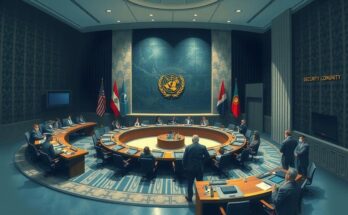Chinese journalists from state-run media have returned to North Korea after five years, as reported by South Korea’s Ministry of Unification. This move follows North Korea’s selective reopening to foreign media amid ongoing strict regulations. Criticism continues regarding the lack of independent reporting from foreign journalists in the country, further complicated by recent border closures for tourists and strict government supervision of media operations.
Journalists from Chinese state-run outlets, CCTV and the People’s Daily, have made a return to North Korea after an absence of five years due to the COVID-19 pandemic, as reported by South Korea’s Ministry of Unification. North Korea has selectively initiated the reopening of its borders to foreign media, allowing a few select agencies, including Chinese, Russian, Japanese, and some Western outlets such as the Associated Press and Agence France-Presse, to set up their bureaus in Pyongyang under strict regulations. This reopening follows a period during which foreign journalists were expelled as part of the country’s stringent border enforcement measures against the pandemic.
The South Korean Ministry of Unification confirmed the entry of Chinese journalists into North Korea on February 27; however, representatives from the Associated Press and Agence France-Presse have not yet returned. The situation regarding Russian journalists remains unclear. Additionally, the pro-Pyongyang newspaper Choson Sinbo has announced the reopening of its North Korean bureau after a five-year hiatus, marking the end of what it termed an unfortunate temporary suspension due to an unexpected epidemic.
The return of foreign journalists coincides with North Korea’s fluctuating signals regarding its openness to foreign visitors. Recently, the country closed its only entry point for foreign tourists, just weeks after allowing them to return for the first time since the COVID-19 ban initiated in 2020. Speculations among South Korean media suggest that this reversal may stem from concerns about the unchecked dissemination of information. Prior to this, only Russian nationals had been permitted to enter North Korea for limited tours since September 2023.
The oversight of where foreign media can operate and the residency of journalists is managed by North Korea’s Korean Central News Agency and the Korean Central Broadcasting Committee. These agencies prepare residency applications for approval from the Ministry of Foreign Affairs, following authorization from the Propaganda and Agitation Department of the ruling Workers’ Party of Korea.
Foreign media operating within North Korea frequently face stringent criticism for their inability to report independently, mainly due to the stringent constraints imposed by the North Korean regime. Journalists experience constant surveillance, have their movements tightly regulated, and are often accompanied by government minders, hindering their capacity to report freely. Critics contend that foreign media bureaus in Pyongyang may inadvertently amplify state propaganda rather than deliver unbiased news, as there is considerable pressure to conform to the regime’s narratives.
In a notable context, South Korea’s public broadcaster KBS expressed interest in establishing its bureau in Pyongyang in 2021. This initiative aimed to advance inter-Korean media collaboration and ensure direct coverage from North Korea. Nevertheless, it faced backlash within South Korea over concerns regarding journalistic independence and the potential dilution of reporting integrity. Moreover, the then-opposition People’s Power Party raised alarms that a Pyongyang bureau could facilitate channels for foreign funding to North Korea, alleging that this arrangement could unfairly burden South Korean taxpayers.
In summary, the return of Chinese journalists to North Korea marks a significant shift in the landscape of foreign media presence in the country post-COVID-19. As North Korea selectively reopens to certain foreign media outlets, the strict oversight and scrutiny under which these journalists operate raise ongoing concerns regarding the independence of their reporting. The situation remains fluid, with mixed signals about border policies and media freedom continuing to emerge from Pyongyang.
Original Source: rfa.org




